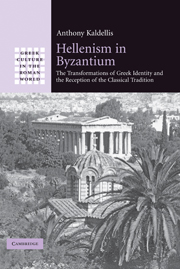 Hellenism in Byzantium
Hellenism in Byzantium Published online by Cambridge University Press: 24 December 2009
It is well known that the people we call Byzantines today called themselves Romans (Romaioi). In the middle period of Byzantium's history, with which the second and more narrative part of this study will be chiefly concerned, this “national” label appears or is pervasive in virtually all texts and documents (excluding the strictly theological) regardless of the geographical and social origins of their authors, which, in Byzantium, were diverse. (“Byzantines” were for them only the residents of Constantinople, archaically styled after the City's classical name.) These Romans called their state Romania (Ῥωμανία) or Romaïs, its capital New Rome (among other names, titles, and epithets), and its rulers the basileis of the Romans, whom we call “emperors.” This Roman identity survived the fall of the empire and Ottoman rule, though it was greatly changed by those events. While in Byzantium the Romans were a highly unified nation, under the Porte they were redefined so as to encompass a multi-ethnic and linguistically diverse religious community. Later, with the foundation of the modern Greek state, romiosyne came to represent the orthodox and demotic aspects of the new Hellenic national persona, complementing the classical and idealistic aspect that was projected abroad. Continuity and change are alike illustrated in a story remembered by Peter Charanis, born on the island of Lemnos in 1908 and later a professor of Byzantine history at Rutgers University.
To save this book to your Kindle, first ensure no-reply@cambridge.org is added to your Approved Personal Document E-mail List under your Personal Document Settings on the Manage Your Content and Devices page of your Amazon account. Then enter the ‘name’ part of your Kindle email address below. Find out more about saving to your Kindle.
Note you can select to save to either the @free.kindle.com or @kindle.com variations. ‘@free.kindle.com’ emails are free but can only be saved to your device when it is connected to wi-fi. ‘@kindle.com’ emails can be delivered even when you are not connected to wi-fi, but note that service fees apply.
Find out more about the Kindle Personal Document Service.
To save content items to your account, please confirm that you agree to abide by our usage policies. If this is the first time you use this feature, you will be asked to authorise Cambridge Core to connect with your account. Find out more about saving content to Dropbox.
To save content items to your account, please confirm that you agree to abide by our usage policies. If this is the first time you use this feature, you will be asked to authorise Cambridge Core to connect with your account. Find out more about saving content to Google Drive.